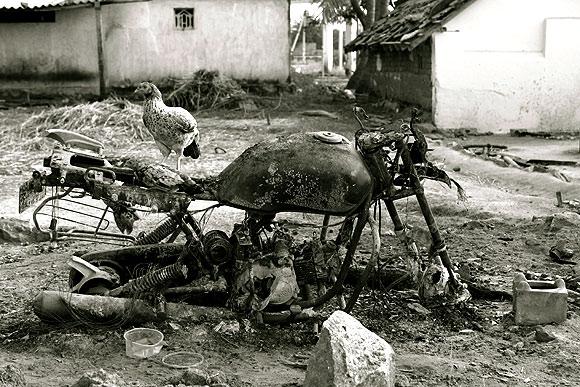
'I still withhold my tears because of the fear that weeping will rob me of my rightful anger, that emotional catharsis will lead to complacence, says poet Meena Kandasamy in this column exclusive to Rediff.com
Five days after visiting the ravaged Dalit colonies of Nathamkottai, Kondampatti and Anna Nagar in Tamil Nadu's Dharmapuri district -- where almost every single home was burnt and looted on November 7, 2012 by a thousand-member strong mob of Vanniyars wielding Molotov cocktails and crowbars -- I still withhold my tears because of the fear that weeping will rob me of my rightful anger, that emotional catharsis will lead to complacence.
The provocation for the organised rampage is attributed to the alleged suicide of Nagaraj, father of Divya, a 20-year-old Vanniyar woman who fell in love with and married 23-year-old Ilavarasan, a Dalit man from Natham.
The local police, keeping their caste sympathies intact are guilty of not just dereliction of duty, but of actually facilitating the violence against the Dalits by failing to check the Vanniyar mob's free-run of destruction.
Having gloriously performed their caste dharma of being passive bystanders to such horrifying violence, they now seem to have taken their job of policing very seriously: They ferry Dalit children in police vans to their schools and do not fail to ask a thousand impertinent questions to every single visitor who wants to step inside these colonies.
...
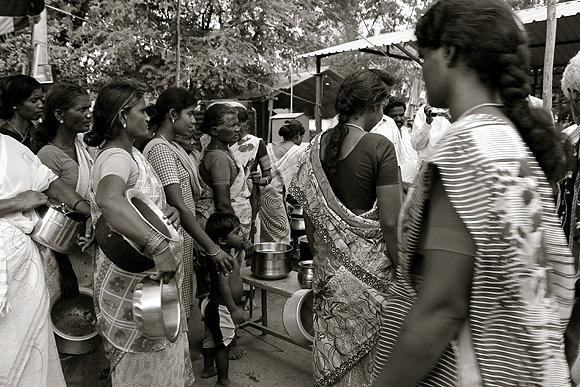
In a district infamous for its female infanticide and atrocities of untouchability, the Naxalite movement took root in the 1970s fighting such oppression. What followed was a regime of police terror to wipe them out.
Palanisamy from Natham colony spoke of the perennial police surveillance of their village because of the Naxalite movement's deep roots in the area. He blamed the inability of the Dalits to retaliate, or even ward off the Vanniyar attacks, on police repression.
"The slightest hint of militancy from our midst would be labelled as Naxalite activity by the State, and we would be silenced as terrorists. The violence inflicted by the Vanniyars will be simply glossed over. Today, we suffer because of the tendency of the State to crush every voice of resistance."
He then recounted how five of the 28 people arrested under POTA (the Prevention of Terrorism Act) following the police encounter of the Naxalite Siva a decade ago, belonged to Natham colony. He describes how in spite of such high alert, the police had worked in connivance with the Vanniyar mob, spreading news of the impending rampage to ensure that the Dalit colonies were evicted.
Today, 21 days after that tragic night, even as the Dalits languish in makeshift shelters and eat at interim relief camps, the state government of Tamil Nadu has failed to take necessary action against the key perpetrators of the violence.
In an evident bid to undermine the extent of their losses, the state government has given the Dalits of these villages a pittance of Rs 50,000 as compensation to everyone whose home was burnt down.
The state government has pegged the overall damage -- 144 homes burnt in Natham colony, 90 in Kondampatti and 34 in Anna Nagar -- at Rs 3.5 crore (Rs 35 million), while the National SC/ST Commission estimates range at about Rs 7 crore (Rs 70 million). Independent NGO fact-finding missions have come up with figures ranging from Rs 12 crore (Rs 120 million) to Rs 25 crore (Rs 250 million).
...
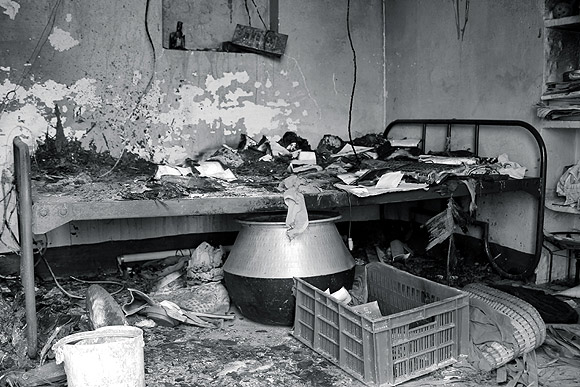
I could write about the absence of grievance redressal, the injustice in granting compensation, the state's laissez-faire attitude in bringing the culprits to book. Or, I could detail how the State's systematic annihilation of the radical left in a district once considered Tamil Nadu's Naxalbari led to the strengthening of caste-based parties and a credo of violence.
Each of this deserves our attention. Some of the photographs taken in these villages show how untouched the Dalit colonies have remained for well over two weeks after experiencing the worst kind of organised caste violence.
But because I want to write into silences, because I want to ask disturbing questions, because I want to say the unsaid, my anger is directed at the PMK party and the Vanniyar Sangam.
Even as the party is being blamed for organising and choreographing this anti-Dalit atrocity, their subsequent statements and unapologetic condemnation of inter-caste love marriages implicates them further in this crime and signals that they are waiting to replicate this model of violence elsewhere too.
Even as (Pattali Makkal Katchi leader ) Dr (S) Ramadoss proudly posits himself as an enemy of love and peddler of unverifiable statistics, one has to pay attention to his statements following the Dharmapuri atrocity. He had the effrontery to claim that Dalit people set fire to their own homes because they were greedy to obtain governmental compensation ('The mob burnt down only a few houses in the three villages while some other Dalits were encouraged by an official to burn down their own houses, promising them compensation in return.').
...
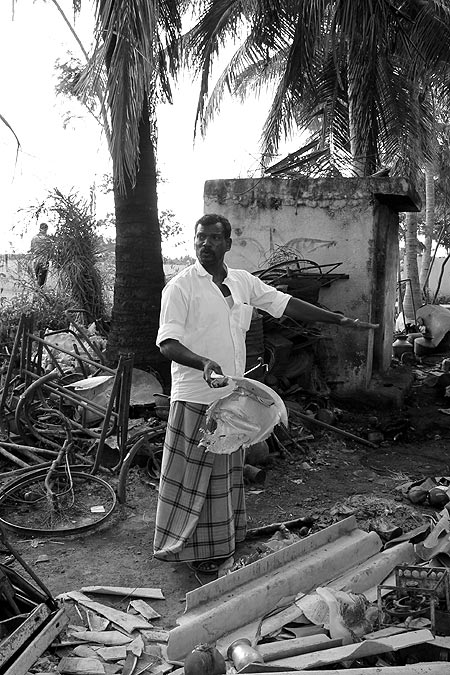
Reasoning that marriages tend to interfere with the education of women, Dr Ramadoss has urged the age of marriage for women to be raised to 21 years.
Divya, the Vanniyar woman whose marriage to a Dalit man was used as the pretext for this violence, is 20-years-old.
According to the Ramadoss logic she misses the Ramadoss cut-off by a whole twelve months, perhaps a period in which he believes she would have imbibed the miraculous feeling of caste loyalty.
Perhaps everybody missed it, but clearly, Dr Ramadoss has insulted the intelligence of women when he sets this arbitrary cut-off age to decide when an adult woman is ready to decide about her marriage.
Women's groups who were outraged by his comments on chastity a few years ago now maintain a deafening silence over his current statements, exhibiting no desire to call him out on his casteism and misogyny.
In another press meet, he has claimed that 95 percent of inter-caste love marriages end in failure. In all his benevolence has Dr Ramadoss addressed the issue of breakdown of marriages in general?
A good starting point for him, and the PMK-Vanniyar Sangam combine also, would be to embark on a campaign to scrap the oppressive institution of marriage itself. By preventing all marriages, he can simultaneously prevent their breakdown also!
...
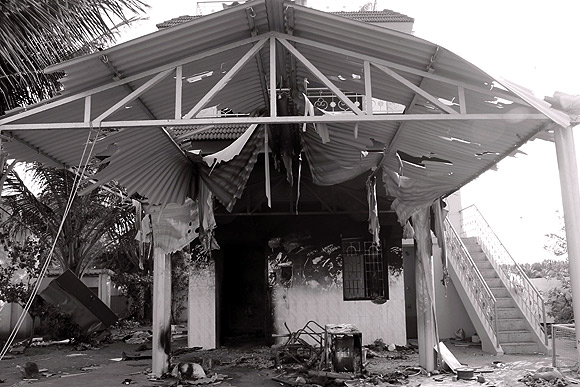
Moreover, Dr Ramadoss has gone ahead and blamed the violence as a direct result of intervention from members of the VCK party who allegedly advised Ilavarasan's family to not send Divya back to her parents.
In saying so, he portrays the entire violence as justifiable anger. Given the gruesome fate that inter-caste couples have faced in Tamil Nadu, Divya's refusal to go to her parents was the sanest decision.
Her return may have allowed fanatics to quench their bloodthirstiness with an honour killing.
This is no exaggeration, because the Vanniyar Sangam's Kaduvetti Guru has repeatedly been broadcasting this message. At a Chitra Pournami event in Mahabalipuram addressing Vanniyar youth, Guru openly exhorted that men of other castes marrying Vanniyar women should be killed.
Even as one bears witness to the inherent anti-Dalit hatred and rage that characterises this speech, it would also serve our interests to read this as a challenge to women's rights, to women's sexuality.
After all, neither Guru nor his Vanniyar Sangam, seem to be worried about the virginity, chastity, love affairs or married lives of Vanniyar men.
To enmesh only Vanniyar women within such paranoid, patronising and protectionist discourse and to disrespect their autonomy is nothing but patriarchal control and sexual subjugation.
One is forced to fall back on these age-old terms to articulate the brutal authoritarianism and blatant misogyny because other wordings will deprive us of clarity.
...
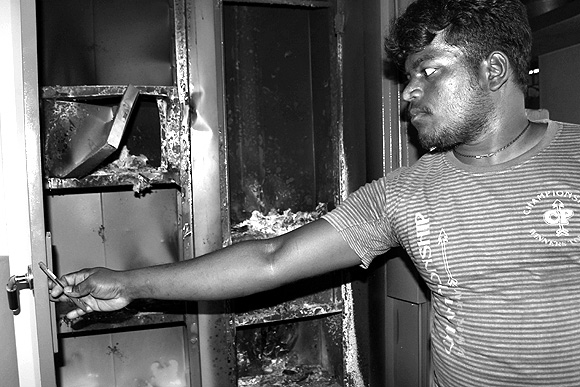
In his postmortem analysis of the Dharmapuri violence, Dr Ramadoss called inter-caste 'love' marriages, especially those involving women from intermediate castes and Dalit men, as a sham and has accused Dalit organisations of seeking to settle scores with intermediate castes under the pretext of such marriages.
'Dalit men were following women from the Vanniyar community claiming to be in love with them and later duping them.' He portrays Dalit men as 'stalkers' and imagines love to be something that can be forced, constructed, and staged, defeating the fact that love springs from spontaneity and without coercion.
One must understand that Dr Ramadoss has not been a vigorous anti-love crusader all his life, and that even now, he is not opposed to the abstract notion of love, but problems arise for such a caste fanatic when love transgresses caste and when it culminates in marriage.
A politician who seeks to prevent Vanniyar girls from exercising their right to choose their partners and determine their future, has forfeited all moral rights to talk about the self-determination of Tamils.
Dr Ramadoss is inculcating not merely hatred towards Dalits, but a new kind of Dalit phobia where men of the Dalit community are being painted as menacing hypermasculine warriors on the prowl, waiting to impregnate caste Hindu women.
Truth belongs to another universe, but such talk of 'groups that dupe our girls in the name of love' is not a new formula. There is no difference between Dr Ramadoss-Kaduvetti Guru and the language of Hindutva that screams of 'love jihad' as a pretext to vilify Muslim men and portray them as anti-social elements.
...
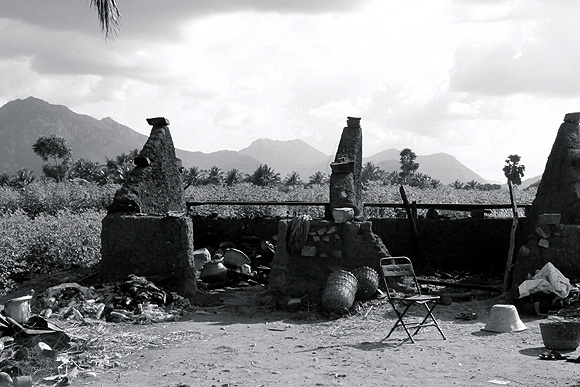
Men who take great affirmation of their masculinity in their rapes of Dalit women, men who maintain respectable silences when the bodies of women secretly transgress the prison of caste, are well aware that the notion of 'caste purity' is a myth.
That is why, instead of harping on the purity of their castes being destroyed, they seek to portray the women of their castes as victims.
This construction of victimhood allows them to ride on a sympathy wave, even as the atmosphere of suspicion enables them to identify their enemy in the public sphere.
It is a shame that in a land with a history of self-respect for marriages, such a campaign against inter-caste marriages has gained momentum.
Our collective silence legitimises the false propaganda of caste fanatic groups like the PMK and the Vanniyar Sangam.
Our silence empowers them to preach their hatred and dabble in more anti-Dalit violence. The obvious violence in policing the bodies of women and the restrictions on whom to marry is an affront to women.
There is no guarantee that this scourge of violence will not permeate to other sections of society; already, one reads reports of violence because of marriages between different Dalit castes.
Kongu Vellala Peravai Gounders are also running similar campaigns to wean away youngsters from the path of love, and now, an organisation has been formed to demand the abolition of inter-caste marriages.
...
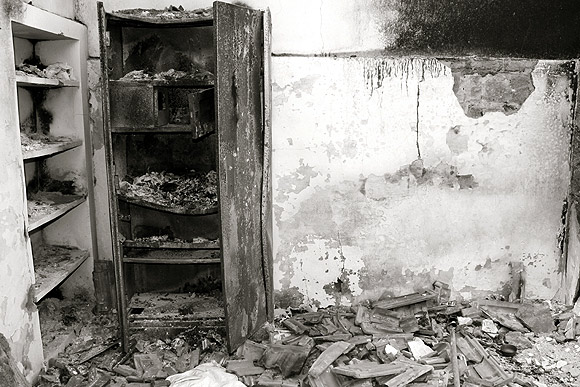
I believe that Indian women -- especially women of the so-called dominant castes who pride themselves in their lineage and proudly flaunt their caste names even as they claim to be progressive -- should break their well-guarded silences now.
As a members of the civil society, we need to move the task of caste-annihilation to the front and centre of our agenda. Failure to condemn this violence shall expose the casteist hypocrisy of our intellectuals and our feminists.
What has happened in Dharmapuri district is not merely anti-Dalit caste hatred, but also the most vicious form of sexual oppression of women.
Though these Dalit colonies had nothing in common, they were targeted for the sole reason that each of them were home to inter-caste (Dalit man-Vanniyar woman) couples.
To reduce this merely to an assault that has taken place along caste lines, or to write this off as just an expression of the backward castes feeling jealous about Dalit economic empowerment is to forget the deep-rooted misogyny and patriarchal control that has pervaded this orchestration of hate.
The terror unleashed in Dharmapuri is an open challenge to all progressive movements in India. We cannot realise any dream of social equality until we divorce ourselves from the forces that spread hatred among the people.
We cannot work towards change without declaring where we stand on the issue of caste and women's rights.
A society organised around confinement within castes, regimentation of female sexuality and mindless violence to counter every transgression will eventually make all of us prisoners if we do not stand up to dismantle its oppressive restrictions soon enough.
Meena Kandasamy is a poet, writer and activist.